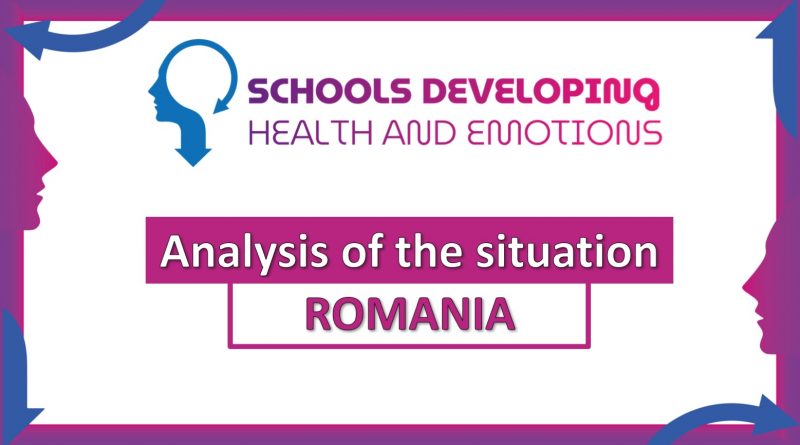Analysis of the situation: Romania
In the frame of Phase I, each project organisation had to analyse the existing situation on each project country on the promotion of health and emotional education in secondary schools and their institutionalization in its country. Here you have a summary of the text written by Liceul Teoretic “Emil Racovita” concerning the situation of Romania:
At the national level, in Romania, there is a recent interest in the well-being and emotional health of students, expressed by decision-makers at the level of the Ministry of Education. Thus, following some discussions with adolescents from high schools in Romania, it is desired, for the time being at a declarative level, the introduction of Emotional Education as a subject in schools. This initiative came mainly as a result of the emotional difficulties felt as a result of the pandemic situation. This discipline is currently taught as an optional subject.
In recent years, various foundations, NGOs such as UNICEF, Save the Children, Junior Achievement Romania are launching national campaigns that meet the requirements of health, physical and mental well-being of students: online safety, bullying, prevention of human trafficking, violence in schools, these are issues that must be discussed during a school year, such as during counseling and guidance classes or educational projects.
The new concepts that are gaining ground in the Romanian educational system are: mindfulness, socio-emotional education (SEELearning), wellbeing. For example, SEELearning is a programme that aims to integrate socio-emotional education into learning environments at the national level, to ensure academic success and the assimilation of healthy life skills of children.
When we talk about well-being, we are talking primarily about physical well-being, which means our body: how we feel, how we take care of our body, how we take care of it every day. It’s about the way we eat, the way we expose it to various harmful substances, about sleep, about how we hydrate it, it’s about the fact that we have time for ourselves to do a little exercise.
Next comes emotional health, which we talk about very little. The physical is perhaps closer to us because we see how we look, we see how we eat, while we sleep. Emotional health is something we do not see. It is practically the way our mind works, it is the neuroscience behind our brain, in which we think thoughts and have emotions and act accordingly, based on the thoughts we have, but sometimes, unfortunately, on the strong emotions we have. That is why, when we learn to manage our emotions, we practically manage our well-being, we manage our relationships. Our emotions act in various ways, and when they react and become aggressive, they destroy the balance and relationships we have with both ourselves and others.
A recent analysis shows that school health programs (health promotion programmess, healthy schools, health-promoting schools, health schools, as they may be called) integrate multiple components that improve the health and education of school children. These programmes may be included in the school curriculum or may be conducted extra-curricularly (such as in the “Week Otherwise” programme).
Regular physical activity is necessary for children to improve their health, including the skeletal and muscular system, the cardiovascular system, weight control and the reduction of obesity, but also the mental state (reduction of anxiety and depression). In addition, physical activity in school plays an important role in improving school performance.
There are many programmes for health education that have been developed in Romanian schools. “Healthy lifestyle for healthy childhood — a healthy child is a happy child!”) was such a programme developed within the program “NCD Child Advocacy in Action Grant”, in the period 2018–2019. The purpose of this programme was to promote a healthy lifestyle among students of different ages.
School plays an important role in children’s daily lives and, as with the school curriculum, is expected to teach children to manage negative feelings and experiences and to cope with aggression and bullying. Undoubtedly, school is the key to students’ cognitive development and mental and emotional health.

